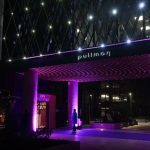If you don’t already feel like somebody’s watching you in Split (cue Rockwell song here), you will now.
Namely, Slobodna Dalmacija reports on June 5, 2019, that the city has announced a tender to purchase video surveillance systems for 13 public areas, and the estimated value of the equipment and its installation is 1.87 million kuna. The areas to be carefully watched include Trumbićeva obala (West Coast), Matejuška, Sv. Frane Church, Marmontova, towards Tončićeva, and Trg Gaje Bulata in front of the theater.
Ulica kralja Tomislava will be supervised at three locations – in front of the pharmacy, at the “Semafor” cafe and in front of the Art Gallery. The Golden Gate of Diocletian’s Palace will be monitored, as will the monument to Grgur Ninski, and there will be a camera at Hrvojeva to overlook Đardin. Peristyle, as expected, will also be filmed.
But that’s not all.
On the Riva, there will be video surveillance at the entrance to the Podrum, and next to the monument to Dr. Franjo Tudjman. The cameras will not escape Pjaca, either.
The surveillance equipment will be located in sensitive areas featuring precious cultural heritage, especially at the Golden Gate of Diocletian’s Palace and Meštrović’s prized work of Grgur Ninski. In this area, the tender calls for a pillar six meters high to fit the camera, so it will be interesting to see exactly where it would be placed.
The tender also requires columns for Ulica kralja Tomislava, Hrvojeva, and the Dr. Franjo Tudjman monument. In the tender from the City, the equipment and supporting works are said to have conservatory approval.
However, video surveillance around Split’s center is no new idea. Recall, it first came to the table in 2014 by Ivo Baldasar. The first attempt was at Peristyle, where in July 2016, cameras were placed at the Šegvić house, when it was the branch office of Splitska banka.
The Elaborate Safety Survey of Public Road Areas was also developed, and the entry and exit at Ulica Domovinskog rata and Poljička have also been approved for the video surveillance system. The main system will be located in Banovina (City Administration), and the remote monitoring that will be possible from the city administration will be performed by the selected security company, but also by the police.
As one of the conditions, it is stipulated that “the provided cameras must have the ability to mask certain parts of the cadres, to prevent the surveillance of individuals and objects.”
Namely, public authorities may collect data for security when the law allows them, but they must ensure that the data they collect is protected. The person in charge of access to information should be named, the data must be kept locked, they must determine who has the entry codes in this area, and the act prescribes how the recordings are processed. Technical and organizational measures for the protection of personal data must be taken, as this video is personal information. It can be kept for six months, unless a special regulation imposes a longer deadline, said lawyer Dijanu Kladar, a legal consultant for personal data protection.
Kladar claims that you can record the public areas and the people in them, but cannot exclude certain people.
“The Personal Data Protection Agency’s opinion is that they can be filmed in public surfaces, but one person cannot be picked out of the mass and put it in a newspaper without their consent,” explains Kladar.
To read more about lifestyle in Croatia, follow TCN’s dedicated page.







